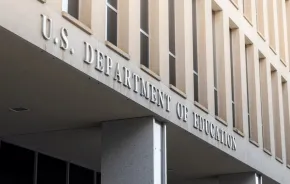
Photo:
Incumbent OSPI Superintendent of Public Instruction and 2024 candidate Chris Reykdal with his family. Photo courtesy of the candidate.
2024 Election prep
To help parents prepare to vote in the general election on Nov. 5, ParentMap reached out to the 2024 candidates for our state’s top education leader role to learn more about their visions for the future of Washington schools and what kind of students they were as kids.
Meet Chris Reykdal
Incumbent Chris Reykdal is the current Washington State Superintendent of Public Instruction, serving since 2017. With a background in education and public policy, he previously worked as a high school teacher and in the State House of Representatives. As superintendent, Reykdal has focused on equity in education, increasing public funding and ensuring post-secondary opportunities for all students. In his 2024 re-election run, he continues to work toward a 100 percent high school graduation rate, safety from gun violence, and educator support. Reykdal holds a Masters in Public Administration from the University of North Carolina, Chapel Hill, and a Bachelor of Arts degree from Washington State University.
ParentMap: How do you plan to address the mental health needs of students, especially in light of rising rates of youth anxiety and depression?
Reykdal: Under my leadership as superintendent, the state Legislature funded additional physical, social and emotional support staff. Those staff include counselors, nurses, psychologists, social workers, family engagement coordinators, etc. With these funds, the Legislature has funded over 600 additional physical, social and emotional support staff positions. In the latest Healthy Youth Survey, students are expressing better mental health outcomes, but we have a ways to go! I also advocated for, and the Legislature funded, regional school safety centers in each of the nine educational service districts. Part of their work, through the Behavioral Health System Navigators, is to coordinate behavioral health system, delivery and suicide prevention training and awareness for school staff. Federally, OSPI was awarded a grant, Project AWARE (Advancing Wellness & Resiliency in Education), that creates the pathways for collaboration between schools, tribes, community partners, educational service districts, and mental and behavioral health providers — with the goal being to increase access to mental and behavioral health services and reduce barriers to those services. Using federal emergency relief funds, we invested in partnerships in multiple communities to teach Hope Education, an evidence-based model to teach students how to retain and build hope and confidence in themselves, which teaches them the skills to push past barriers and overcome adversity.
I am proud to say that youth suicide in our state has dropped by 25 percent over the last six years. One student is too many, but the gains we have made are bucking national trends.
Going forward, we must rewrite our learning standards to substantially engage and educate students in media/digital/information literacy and digital media’s effect on mental health. Our regional mental health networks are having a very positive impact, but that is a response system. We now need to redesign the way we deliver instruction and supports in the modern age to address the growing anxiety students are bombarded with via social media and other propaganda pushers. We must address mental health before students are in crisis. We must teach kids about the tools they are using (the strengths, risks, and harms). Our team is building specific learning standards and support materials for educators and parents to support students before they are dominated by the negative effects of social media and other stressors.
PM: What strategies do you propose to address and prevent gun violence in schools and ensure the safety and security of all students and staff?
Reykdal: Gun violence is harming and killing Washingtonians, and our kids in school are no exception to this truth. We can’t bring back the victims we’ve lost to this epidemic, but we can change the course of our future — gun violence is preventable, and we need strong gun safety advocates in leadership positions! Our team is the first OSPI team to explicitly call out gun violence as a public health risk and crisis, and we have provided direct guidance to families on safe storage. We did this in partnership with the Department of Health, the Alliance for Gun Responsibility and other ally groups. Through the Healthy Youth Survey, we know that very few students bring weapons to school, but too many of them do report relatively easy access to guns in the home. Public education has a responsibility to teach young people about the risks of firearms from accidents, suicides and homicides. The only progress this country has ever made on any crisis, has come when education complemented legal changes.
We need to keep moving the age of gun ownership up until it aligns with the science of fully formed brains and decision making, and we need to make more adults responsible when minors access a gun in the home that results in accidental deaths or crimes.
As superintendent (as well as during my time in the Washington state Legislature), I have supported and will always support policies to reduce gun violence and advocate for the safety of our children. I will continue to stand up to the gun lobby and fight to keep guns out of our schools and out of the hands of our children.
PM: What is your stance on cell phone use in schools and how do you plan to balance the benefits of technology with the need to minimize distractions?
Reykdal: We now have ample evidence that cell phones are both a learning device and a distraction when not properly contextualized in classrooms. I do not believe in “banning” cell phones, but my office is working on guidance to districts that identify three or more strategies that other states/local districts have effectively used to shape better cell phone usage in schools. Our guidance will come out in late summer/early fall and it will challenge districts to more intentionally adopt their own local policy. Only local boards or the Legislature can force a cell phone policy; my office will provide the research, technical guidance and policy options for local districts to adopt better practices that work for their community.
PM: What measures will you take to address the achievement gap and ensure equitable education outcomes for all students?
Reykdal: For too long, we used the phrase “achievement gap” to describe persistent differences in academic achievement across student groups. While we are closing graduation gaps faster than any time in our history, we still have opportunity gaps that result in achievement gaps – not every student is resourced equitably or supported equally. We can achieve a 100 percent graduation rate if we take a more sincere, more persistent and more honest approach to how we fund our schools and support our students. All students and communities deserve a fully funded education system that recognizes that not all communities are the same.
Our students deserve to experience teachers, administrators and school boards that are as diverse as they are.
We have made substantial progress on increasing the racial diversity of our educators over the last six years, particularly among our beginning teachers, but we have much more work to do before our educators will truly be reflective of the students they serve. In addition, for too long, our state has underinvested in services for our students with disabilities, and we have done all students a disservice by supporting the learning of our students with disabilities in environments separate from their peers. We are changing this! We are rapidly moving toward full funding of services for our students, and our work around inclusionary practices has gained national attention.
Under my leadership, funding for students with disabilities has doubled from $1.1 billion per year to $2.2 billion.
Our state resources must be targeted, however, beyond formula funds to schools and students that would benefit from additional support. Our data systems are now drilling down to expose the disproportionate impacts of our education funding policies, and we are making changes to the way we resource our schools.
As your state superintendent, I have diversified the OSPI staff and we have created a policy framework that embeds solutions to the opportunity gap in everything we do! Not a single policy is promoted from my office that does not fully examine the impact on our diverse communities. From policy development, to grant funds, to professional development for our school districts and regional educational service districts; everything OSPI does to approach 100 percent graduation rates has an acute eye to the populations that have been systematically denied opportunity in our past and still today. And we have improved graduation rates faster for these targeted student groups, but there is more to be done! Embracing diversity is not an exercise in being color-blind. Quite the opposite; it is absolutely about seeing race, seeing diversity, having crucial conversations, and strategically investing in our communities to cultivate a greater passion about our public schools and to set high expectations for all students.
PM: What is your perspective on Senate Bill 5462, which was recently approved by the Washington Legislature. This bill requires that schools update curriculum to include LGBTQ+ histories, perspectives and contributions.
Reykdal: I absolutely support this bill! Our LGBTQ+ students deserve to see themselves in our history books and curriculums.
I will always fight for justice for our LGBTQ+ learners, and representation is just one part of that puzzle piece.
Other pieces are ensuring safety (physical and emotional) for our students, supporting access to gender-affirming care (this includes honoring a student’s chosen name and pronouns in the classroom), and ensuring Title IX laws are being protected with gender-inclusive bathroom access and inclusion in sports and other activities.
PM: How would you describe the kind of student you were when you were in school?
Reykdal: I grew up the youngest of eight kids on public assistance, so I didn’t get much help outside of school, but I loved learning and the classroom was my place to shine. I was curious, and I asked lots of questions. I also sat in the front because I don’t have functioning vision in my right eye. Being in the front also meant less distractions.
I was the first in my family to go straight to college, and I have dedicated my entire professional life to improving the learning opportunities for every Washington student!
PM: What was the last book you read? What’s one thing that surprised you about this book?
Reykdal: I generally have three or four books going at a time; always non-fiction (except the books I read to students in classrooms). Right now I have three books I am reading for the first time, and one I am rereading:
“Justice in Search of Leaders” by Gloria Graves Holmes; “Free to Learn: Why Unleashing the Instinct to Play Will Make Our Children Happier, More Self-Reliant, and Better Students for Life” by Peter Gray; “Visible Learning, The Sequel: A Synthesis of Over 2,100 Meta-Analyses Relating to Achievement” by John Hattie; and “Brave New Words: Brave New Words: How AI Will Revolutionize Education (and Why That’s a Good Thing)” by Salman Khan.
All of these books take their aim at describing an education future not yet realized in order by racial justice, more student play, data-driven decision making, and the potential of artificial intelligence in customizing learning. No surprises here, but one observation — all of these dynamics can, and should, play out together!
PM: Describe your ideal Pacific Northwest day.
Reykdal: My ideal PNW day is on a mountain above the tree-line hiking in temperatures in the low 60s, generally above 6,000 feet, just outside the national parks, so I can take our dog Brandy with me. All the doggo fun, but great vistas of the parks. I prefer to hike into lakes or along rivers. If my wife Kim and our two kids are with us, it makes it an ideal day!
Methodology
We sent the same questions to the 2024 candidates via email. These are their unedited, full responses. The only changes we made were to address any typos. ParentMap wrote the bios that are included for each candidate.











